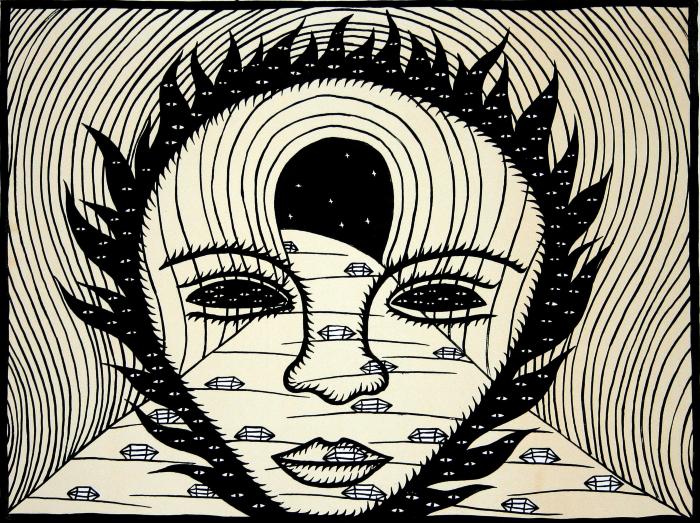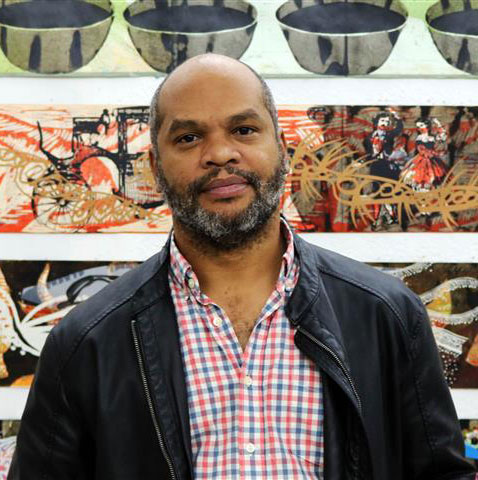
El Túnel
Ibrahim Miranda
- 1999
- Screenprint printed in light tan and black inks
- Image: 1¼ x 24 ";Sheet: 21¾ x 27½ "
- 2009-61-57
About the Print
From the Artist
The tunnel, serving as a middle passage between thoughts and dreams, between one reality and the next, sets the scene for this surreal print. A mask-like face looms large as a river flows into the deep beyond. With eyes scattered within its large eyes and flame-like hair, the transparent apparition in the foreground appears to possess an all-seeing power that must be met on its own terms. Little crystal shapes travel upstream toward the black night as if to join the diamond-like points in the dark sky. Perhaps each little point represents a separate dream, thought, or soul floating out among the stars.
La obra El Túnel es una especie de autorretrato, es una idea sobre la introspección y el aislamiento del ser humano.
(The work El Túnel is a kind of self-portrait, it is an idea about the introspection and isolation of the human being.)
–Brandywine Workshop and Archives records
The tunnel, serving as a middle passage between thoughts and dreams, between one reality and the next, sets the scene for this surreal print . A mask-like face looms large as a river flows into the deep beyond. With eyes scattered within its large eyes and flame-like hair, the transparent apparition in the foreground appears to possess an all-seeing power that must be met on its own terms. Little crystal shapes travel upstream toward the black night, as if to join the diamond-like points in the dark sky. Perhaps each little point represents a separate dream, thought, or soul floating out among the stars. Ibrahim Miranda builds the image with strong black lines and shapes (ovals for the face and eyes, a triangle for the receding river). The tunnel’s repeated curving lines give a soft rhythm and depth to the print, while borders hold everything in place.
Let's Look
- Describe this scene. What do you see? Where is this taking place? What is going on?
- What kinds of emotions does this image evoke? How does Miranda inspire these feelings?
- Look closely at the details of the face. Why might the artist have included so many eyes?
- If this were a dream, what kind of dream would it be? What might this mask-like face want or be trying to tell you?

Ibrahim Miranda
Cuban
Born in Pinar del Río, Cuba, 1969
Image courtesy of Graphicstudio / University of South Florida. Photograph by Will Lytch
About the Artist
Painter and printmaker Ibrahim Miranda was born in Pinar del Rio, Cuba. He attended the Instituto Superior de Arte, Havana.
Miranda is represented in the collections of institutions around the world, including the National Museum of Fine Arts, Havana; Museum of Modern Art, New York City; and Museum of Fine Arts, Boston. Miranda was invited to exhibit at the Boston Printmakers 2013 North American Print Biennial. He lives and works in Havana.
—From Brandywine Workshop and Archives records
Curriculum Connections
Suggested Topics for Art Projects, Group Discussion, and Independent Writing
Art
Depict a Dream
Ibrahim Miranda creates a kind of dream like vision in El Tunel. Recall one of your dreams and illustrate it. Consider contrasting black and a light color like Miranda did in his print. As an extension, create a print from your drawing.
Make a Self Portrait
Miranda often places visual images directly onto maps of Cuba as well as cities and places far away from Cuba. Make a self-portrait by first select ing a page from a newspaper or magazine that somehow relates to who you are as a person. Next, decide how to make your image work well on the background text or image.
Language Arts
Tell a story
Imagine that this print is an image from a dream you are having. What is the story? What is happening now? What happened before this moment? What happens next? How are you reacting?
In Your Opinion
Consider Miranda's quote about his artwork. In your opinion, does El tunel reflect the spirit of his words? How? If not, why not?
Social Studies
Cuban Culture
Cuban culture is a rich blend of African, European, and ind igenous influences. Research how these different influences have shaped Cuban culture (art, dance, music, literature, and architecture) and history.